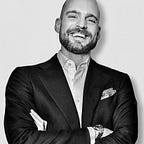What happens when creatives stop working for brands and start building their own? We’re about to find out.
Introducing: Orli&. On a mission to turn creative talent into the defining business and civic leaders of the 2020’s.
For the last 15 years, I’ve explored new ways of working creatively with brands, businesses, media companies, and civic organisations. As an agency leader at two of the world’s most awarded consultancies in marketing, comms and digital, I’ve seen brand strategy and creative work transform from a management-led, fee-based model to a creatively-led, platform-based paradigm known as ‘the creator economy’. Right now, we’re witnessing a massive shift in how creative talent operates, and the simplest way to frame this development is to break it down into three phases.
2000–2010: Creators work for brands.
The best creative talent resides at agencies and production houses, operating as dedicated teams that do great work for clients who pay for their time.
2010–2020: Creators work with brands.
The best creative talent becomes increasingly independent, operating as freelancers for top agencies or in-house creative directors for ambitious brands. Influencers and content creators work with clients who pay for distribution.
2020–2030: Creators build their own brands.
The best creative talent builds businesses, operating as founding teams that are uniquely skilled and positioned to launch successful brands. Ex-clients fund their business development and growth through partnerships, investments or acquisitions.
There are tons of examples of the third phase already — separate endeavours in their own right, but aggregated, chapters in a larger story. The most famous ones feature lifestyle influencers launching their own product lines — some successful, some struggling, and most overvalued due to hype and media exposure. More underestimated are the content creators operating in specific verticals, who monetise their expertise through everything from online courses to micro consulting. In the coming decade, they will transform their passions and interests into fully-fledged businesses.
The biggest potential, however, lies in the talent currently operating as creative professionals: designers, writers, art directors, photographers, artists, architects, and publishers. In a Nordic context, some of the most interesting ventures in recent years — Doconomy, Alma, Omnipollo, CDLP, Estrid, Closely, and UNIFORM — have all been founded or co-founded by such talent. They excel in brand building, visual communication, and product narratives, creating substantial moats.
People say it’s never been easier to build a brand than it is today. The truth is that it’s never been more difficult. Marketing and distribution are critical skillsets, and creators are perfectly positioned to deliver on them.
This is only the beginning. In the early 2020’s, we’ll see a surge in creatively-led businesses. Why? As with most paradigm shifts, it has to do with a combination of things.
- The new media landscape, in which content craftsmanship is vital for launching new businesses, giving creators an unfair advantage over traditional entrepreneurs.
- The no code movement, in which MVP:s can be built with GUI-based tools, allowing non-technical founders to validate product ideas faster and cheaper than before.
- The access to capital, in which angel investors, seed funds, and non-traditional VC:s — corporates, foundations & private equity — are all looking for the next big thing.
That said, there are still many barriers to entry. Creators usually don’t have a track record of building product and raising capital, so traditional investors won’t bet on them. They’re not interested in entrepreneurship as a lifestyle, so traditional incubator programmes don’t attract them. Predominantly, creative talent is underserved by the startup ecosystem, which mostly favours engineers and MBAs. I know, because I’ve seen it both from the outside and the inside.
As a creative director with a Cannes Lions Grand Prix who got an Oxford MBA and became a business executive, I know firsthand about the colliding cultures of innovation and operations. As an entrepreneur and founder currently raising a seed round, I see what difference a creative background can make when going from zero to one. And while creative talent has much to learn about LTV:CAC ratios, market size metrics, and burn rates, their contribution is infinitely more valuable: ideas. Well-told, well-crafted, and well-distributed.
Let’s build them.
Introducing: Orli&. Connecting creators with capital and civic society in new and exciting ways.
Orli& connects creators, capital and civic society to build meaningful things. Operating as a founding partner to new ventures and a growth partner to established companies, foundations and investment firms, we support creative talent to become the defining business and civic leaders of the 2020's.
Orli& starts, scales and supports creatively-led ventures through three types of partnerships.
- A founding partner to creative talent building new ventures, both in the commercial and civic space. Long-term commitment is guaranteed through equity-based partnerships, ranging from operational to advisory.
- A growth partner to companies and organisations looking to innovate through new partnerships. Services include growth strategy, collaborative R&D and due diligence of existing partnerships.
- A talent partner to investment firms that need support in evaluating brand equity of current or potential portfolio companies, and optimise marketing performance through strategic hires.
These are not three separate practices — together, they are an integrated approach to building and funding creatively-led companies.
Starting today.
Interested?
We have a closed WhatsApp Group for selected creators, business leaders and investors, sharing monthly updates on new opportunities and current partnerships, as well as the latest news on the creator economy. Apply here.
We also do a limited number of keynote speeches and masterclasses at relevant academic events and industry forums. Inquire here.
In all other matters, you’re welcome reach out directly to david@orlic.se. Thankful for any and all feedback, thoughts and ideas.
Thanks for your time,
David
